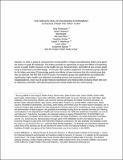The Oregon Health Insurance Experiment: Evidence from the First Year
Author(s)
Taubman, Sarah; Wright, Bill; Bernstein, Mira; Newhouse, Joseph P.; Allen, Heidi L.; Baicker, Katherine; Gruber, Jonathan; Finkelstein, Amy; ... Show more Show less
DownloadFinkelstein_The Oregon.pdf (483.1Kb)
OPEN_ACCESS_POLICY
Open Access Policy
Creative Commons Attribution-Noncommercial-Share Alike
Terms of use
Metadata
Show full item recordAbstract
In 2008, a group of uninsured low-income adults in Oregon was selected by lottery to be given the chance to apply for Medicaid. This lottery provides an opportunity to gauge the effects of expanding access to public health insurance on the health care use, financial strain, and health of low-income adults using a randomized controlled design. In the year after random assignment, the treatment group selected by the lottery was about 25 percentage points more likely to have insurance than the control group that was not selected. We find that in this first year, the treatment group had substantively and statistically significantly higher health care utilization (including primary and preventive care as well as hospitalizations), lower out-of-pocket medical expenditures and medical debt (including fewer bills sent to collection), and better self-reported physical and mental health than the control group.
Date issued
2012-05Department
Massachusetts Institute of Technology. Department of EconomicsJournal
Quarterly Journal of Economics
Publisher
Oxford University Press (OUP)
Citation
Finkelstein, A. et al. “The Oregon Health Insurance Experiment: Evidence from the First Year +.” The Quarterly Journal of Economics (2012): n. pag. Web. 1 June 2012.
Version: Author's final manuscript
ISSN
0033-5533
1531-4650